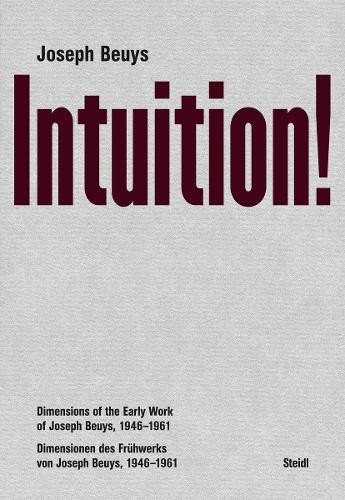
Joseph Beuys: Intuition!: Dimensions of the Early Work of Joseph Beuys, 19461961
(Hardback)
Available Formats
Hardback
Published: 6th November 2022
Hardback
Published: 6th November 2022
Hardback
Published: 6th November 2022
Hardback
Published: 23rd November 2022
Publishing Details
Joseph Beuys: Intuition!: Dimensions of the Early Work of Joseph Beuys, 19461961
By (Author) Joseph Beuys
Foreword by Harald Kunde
Text by Anne-Marie Bonnet
Text by Susanne Figner
Text by Volker Harlan
Text by Karlheinz Koinegg
Text by Bettina Paust
Text by Petra Richter
Text by Wolfgang Zumdick
Designed by Holger Feroudj
Steidl Publishers
Steidl Verlag
6th November 2022
Germany
Classifications
General
Non Fiction
Sculpture
Installation art
709.2
Physical Properties
Hardback
256
Width 210mm, Height 297mm
1340g
Description
This book examines the crucial period between Joseph Beuys' return to his hometown of Kleve after World War II at the age of 24 and his appointment as a professor at the Kunstakademie Dsseldorf in 1961. During this "incubation" phase, key themes relevant to his future work emerged, which now structure this book: biography as material for artistic forming; Beuys and poetry/romanticism; natural sciences: physics, chemistry, botany, zoology and geography; philosophy/anthropology Steiner; evolution; economics, capitalism, labor, politics. The aim of this book, along with the 2021 exhibition of the same name at Museum Kurhaus Kleve for which it is the catalogue, is neither to venerate a local saint of Kleve nor to topple an artist from an earlier generation. Instead it highlights the influences, ideas and caesuras that saw Beuys develop from a "sensitive traditionalist" into a "visionary social sculptor."
Author Bio
Widely regarded as one of the most influential artists of the twentieth century, Joseph Beuys (1921-86) was a sculptor, draughtsman, action and installation artist, as well as a teacher, politician and activist. After serving as a soldier in World War II, experiences that would strongly shape his practice, he studied sculpture at the Kunstakademie Dsseldorf, where he was made professor in 1961. From the early 1960s Beuys dissolved the difference between his biography and art, and increasingly employed his persona and charisma in what he deemed art's ultimate purpose: to radically democratize society. He called for the adoption of his universalist conception of art as a creative, transformative force within politics, science, philosophy and economics. Now as then, Beuys exerts a palpable influence upon artistic and political discourse.
